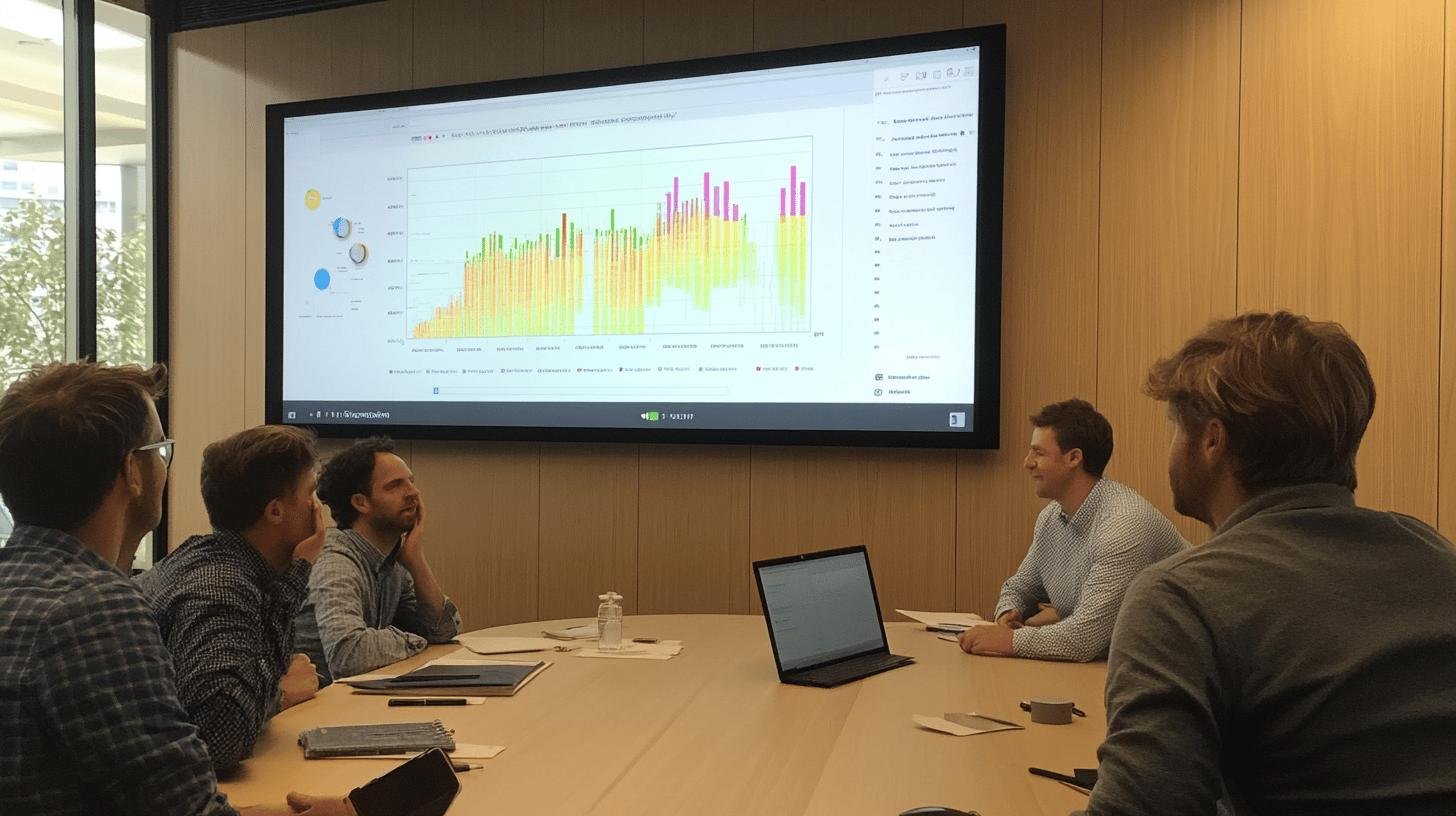This is how you can make better decisions in your business. AI tools for decision-making! If you’re in business, you’ve surely heard about AI tools and their impact. But are they really better than human decision-making? Let’s see! AI isn’t just the realm of sci-fi movies anymore; it’s influencing how businesses make decisions. These tools analyze tons of data, mimicking our brainy ways but leaving out the blunders. It’s like having a team that never sleeps, delivering precise choices round the clock. Welcome aboard the AI train—where your business gets that extra edge!
Understanding AI Tools for Decision-Making
AI tools for decision-making act like a super-smart assistant that’s always ready to help. They use AI algorithms to analyze data and solve complex problems, guiding businesses to make wise choices. These tools function like a digital brain, mimicking human thinking without errors. By studying large amounts of information and recognizing patterns, AI takes the guesswork out of decisions, leading to more precise outcomes.
Some key features of these AI tools include:
- Data Analysis: Handles large data sets quickly and accurately.
- Predictive Analytics: Anticipates trends and outcomes to inform future plans.
- Natural Language Processing: Understands human language for better insights.
- Automation: Simplifies repetitive tasks, saving time and reducing mistakes.
- Visualization: Presents complex data as easy-to-understand charts and graphs.
These features speed up business decisions and make them more reliable. By offering accurate insights and predictions, AI tools let companies react swiftly to changes and capitalize on opportunities they might’ve missed. With AI, you can make informed choices, refine strategies, and ultimately enhance your profits.
Key Benefits of Using AI in Decision-Making

Wondering how AI simplifies decision-making? Here’s how: AI processes vast data at lightning speed, allowing for faster and more accurate business decisions. Machine learning enables AI to identify patterns and predict outcomes better than humans. With natural language processing and computer vision, AI interprets data like a pro, smoothing the decision-making process.
Six remarkable benefits AI offers in business intelligence and decision-making are:
- Real-Time Data Processing: AI handles incoming data, providing instant insights.
- Accurate Predictions: Offers reliable forecasts to help plan future strategies.
- Informed Recommendations: Suggests actions based on data patterns for optimized decisions.
- Cost Efficiency: Reduces errors and saves on labor costs through automation.
- Improved Risk Management: Anticipates risks and presents solutions to avoid them.
- Enhanced Customer Insights: Examines customer data to tailor services to their needs.
How do these benefits play out in different sectors? Imagine a retail store using AI to forecast shopping trends, keeping shelves stocked with desired items. Or a healthcare facility employing AI for faster disease diagnosis, improving patient care. AI tools streamline operations, keeping businesses agile and competitive. It’s like having a tech-savvy partner that keeps your business ahead.
Challenges in Implementing AI Tools for Decision-Making
Implementing AI tools isn’t always easy. One major challenge is managing huge amounts of data—like trying to drink from a firehose. Plus, setting up AI models can be costly. Then there’s the ethical side: AI decisions can be biased, especially if data is flawed. Businesses must proceed carefully to avoid these pitfalls.
Here are four challenges to be aware of:
- Data Overload: Managing vast data without missing valuable insights.
- Costly Implementation: High initial setup and maintenance costs.
- Bias and Fairness: Ensuring AI decisions remain fair and unbiased.
- Complexity: Navigating and operating intricate AI models.
How can businesses overcome these hurdles? Invest in scalable data solutions to manage data floods. Think long-term for cost efficiency—AI can save money later. To mitigate bias, use diverse and representative data sets. Simplifying complexity through training and user-friendly interfaces helps teams familiarize themselves with AI tools. With these strategies, businesses can sidestep common challenges and make AI work in their favor.
Top AI Tools for Decision-Making

Choosing the right AI tool is like selecting the perfect gadget—it can make your day. The ideal AI tool boosts your business by converting data into actionable insights. Let’s explore some top AI tools transforming decision-making!
1. ClickUp
ClickUp is a powerful tool offering features that are both quick and reliable. Think of it as your business’s Swiss Army knife—handling everything from task management to data visualization. Its free pricing model makes it accessible to any business. With ClickUp, enjoy a seamless interface that aligns your team and projects. Who doesn’t love a tool that works hard yet remains user-friendly?
2. Athenic AI
For data enthusiasts, Athenic AI could be your new favorite. It’s excellent at crunching numbers and visualizing them as eye-catching graphs. Think of it as a personal data scientist, ready to deliver insights. Athenic AI helps businesses spot trends and make informed decisions without getting bogged down with spreadsheets. Plus, it’s designed to be easy to use, so no specialized knowledge is required!
3. Baseboard
Baseboard excels in natural language processing, ideal for data visualization. Imagine asking your AI questions like a coworker and receiving detailed visual reports. This tool turns data into easy-to-understand visuals, perfect for businesses wanting enhanced analytics without jargon.
4. PlotGPT
PlotGPT specializes in customizing data analysis for specific industries. Be it healthcare, finance, or retail, this AI tool tailors its insights to your needs. Think of it as a custom-tailored suit for your data. PlotGPT gives businesses an edge by providing industry-specific trends and predictions, leading to informed decisions.
How to Choose the Right AI Tool for Your Business
Selecting the right AI tool is like picking the perfect running shoes—it impacts your performance. Evaluating AI tools is crucial for pushing your business forward. The goal is to find a tool that aligns with your needs, ensuring value for money. Look beyond features to how the tool fits your workflow and goals.
While seeking the perfect AI tool, consider these criteria:
- Data Collection Capabilities: Can it gather the data you need?
- Processing Efficiency: Does it handle data swiftly and smoothly?
- Optimization Features: How well does it refine decision-making processes?
- Prediction Accuracy: Are its predictions reliable?
- Integration Ease: Will it integrate with your systems?
Integrating AI tools into your business shouldn’t be stressful. Once chosen, ensure it blends smoothly with your systems. Look for tools with seamless integration options, minimizing disruption. Combining tools like Mind Pal with GPT-4.0 can boost productivity, allowing smarter decisions. Think of integration as preparing for your AI tool to enhance your team’s efficiency and decision-making power.
Future Trends in AI Decision-Making

AI adoption has soared since 2019, with 50–60% of companies now using it. AI has become the new trend everyone wants to follow. This surge is fueled by AI’s ability to process real-time data. Companies love it for its precision and optimization in decision-making. With AI continuously improving, businesses are jumping aboard to remain competitive.
Four trends are poised to revolutionize AI in decision-making:
- Increased Personalization: AI tools will personalize decisions to client needs.
- Enhanced Predictive Analysis: Expect more accurate forecasts and strategic insights.
- Better Integration: AI will merge more seamlessly with existing systems.
- Improved User Interfaces: Easier, more intuitive interfaces will become standard.
Looking ahead, these trends will significantly impact industries. In healthcare, AI might anticipate patient needs before symptoms appear. In retail, personalized shopping could become the norm. Finance could benefit from rapid automated risk assessments. Overall, AI’s future promises improved efficiency and alignment with audience needs. So, brace yourself—AI is advancing rapidly!
Conclusion
AI tools for decision-making are shaking up how businesses operate. They’re speeding up and refining decision processes, making companies nimbler and sharper. While they come with challenges—like ethical questions and tech hurdles—solutions are emerging to tackle these issues head-on.
Whether you’re eyeing ClickUp for its reliability or Athenic AI for its analytics prowess, choosing the right tool is crucial. Picking wisely can enhance productivity and streamline business decisions. As AI continues to grow, staying updated will keep you ahead of the curve. Let’s embrace these smart helpers and boost our decision-making game!
FAQ
How do AI tools improve decision-making processes?
AI tools analyze large datasets to identify patterns, provide insights, and automate decision-making, enhancing accuracy and speed.
What industries benefit most from AI-driven decision-making?
Industries like finance, healthcare, retail, and logistics leverage AI to optimize decisions in areas like risk assessment, customer behavior, and supply chain management.
Can AI tools be customized for specific business needs?
Yes, AI tools can be tailored to address unique challenges and goals, ensuring that decision-making solutions fit a business’s specific operations.




